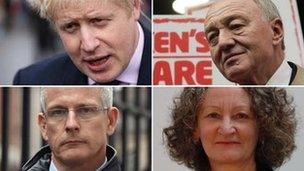Q&A: London mayoral and London Assembly elections 2012
- Published
Your questions about the London mayoral and London Assembly elections answered.
What are the responsibilities of London's mayor?

Who will be the next mayor?
The role is described as being one which promotes "economic development and wealth creation, social development and the improvement of the environment" in the capital.
The mayor has responsibility for policies regarding London's transport, planning and development, culture and the environment. The mayor is also directly accountable for policing performance in London.
He or she also sets the budgets for the Greater London Authority, the Metropolitan Police, London Fire Brigade and Transport for London.
How long has the role of mayor existed?
The first mayoral election was held in May 2000. It was won by Ken Livingstone, who stood as an independent candidate, having been exiled by Labour.
By the time the next poll took place, four years later, Mr Livingstone had been welcomed back by the party and won the election as a Labour mayor. In 2008, Boris Johnson defeated Ken Livingstone to become the first Conservative Mayor of London.
Is there a limit on the time a mayor can serve?
No. In 2007, an attempt was made in Parliament to curtail the position to two four-year terms. However, this was rejected by MPs.
When is the next election for mayor?
Thursday 3 May 2012.
What is happening on that day?
Registered voters will be given a ballot paper offering the chance to pick a first-choice and a second-choice mayor. They do not have to select a second-choice candidate but if they do, this vote will count towards the process of elimination which will be used during the count.
If one candidate has secured an outright majority of more than 50% of the first-choice votes, they are automatically declared to be mayor. If this does not happen, the two candidates with the most first-choice votes will be announced (let's call them A and B) and the others will be eliminated. The ballot papers of the eliminated hopefuls will be re-examined and if there are any votes for candidates A and B, these will be added to their totals.
Whoever has the most votes between candidates A and B is declared mayor. If the results are tied at this stage then the Greater London Returning Officer draws lots.
When it comes to voting for the London Assembly, each ballot paper offers two choices. Voters can pick a candidate and also a party to support. There are 14 constituencies and the candidate with the most votes in each area will be elected.
A further 11 seats are available under the proportional representation system. These will be allocated from the second votes to the different parties under a complicated method known as the d'Hondt formula. Assembly members will be chosen from a further list of candidates held by each party. If party A receives two seats, then the first two people on its list are elected, and so on.
Who is running for mayor?
Boris Johnson is the Conservative candidate again hoping to secure his second term as mayor. In a re-run of the 2008 election, Ken Livingstone stands as the Labour candidate and Brian Paddick will be representing the Liberal Democrats.
Jenny Jones will be standing for Green Party, Lawrence Webb will be standing for the UK Independence Party and the BNP candidate is Carlos Cortiglia. Siobhan Benita is the only independent candidate.
Who can vote?
Residents of London's 32 boroughs - plus the City of London - are eligible to vote, as long as they are on the electoral register. You must be 18 or over on 3 May 2012 and be a British, Commonwealth or EU citizen.
How do I register to vote?
Anyone not already on the electoral roll can ask to be added - the deadline is 18 April.
When will the results be known?
Ballot papers will be "securely stored" overnight at counting centres at Alexandra Palace in Wood Green, the Excel conference centre in Docklands and the Olympia hall in Kensington.
Electronic counting will begin at 08:30 BST on Friday 4 May. Ballot papers are scanned through special machines which count the votes and take into account the different voting methods. The winner of the mayoral contest, and the results of London Assembly seats are due to be announced that evening.
- Published31 January 2012